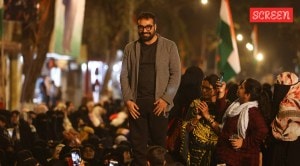Goal rush no substitute for gold rush
With the dust settled and the last bhangra danced, the home truth sinks in: India’s performance against Pakistan, though thrilling, was...

With the dust settled and the last bhangra danced, the home truth sinks in: India’s performance against Pakistan, though thrilling, was neither planned — it was the result of an amazing adrenalin burst — nor possible to replicate with any degree of consistency against a more organised side than Pakistan were on Friday.
In short, India’s woefully frail tactical play was exposed yet again.
India came to the Champions Trophy as the team to watch but from the first match — the slump against Holland — it was clear to experts that Indian hockey was, as usual, high on talent but short on strategy.
In the first four pool matches the Indians couldn’t compete tactically against three different brand of hockey — Europeans (tight marking and use of wingers), Australian (fitness and speed) and Latin American, a blend of different styles. The legendary Ric Charlesworth — captain and then coach of the Australian team — is baffled as to why Indian hockey hasn’t learnt from past mistakes. ‘‘For the past 28 years, India go to a tournament with high expectations but have failed to qualify for the semifinals’’, he told The Sunday Express.
‘‘It would be a farce to compare the quality of the teams that India faced they won recently with those in the Champions Trophy. Pakistan and Australia have come with their main teams. How could your coaches take those results seriously?’’ This lack of planning, or the tendency to take things for granted, contrasts with ‘lesser’ teams who’ve worked their weay to the top.
The South Korean players aren’t here but their technical team is, making video recordings of every match for analysis back home. Their rise to the top was masterminded by Kim Sung-Ryul, who ironically first learnt his trade at the National Institute of Sports in Patiala.
Now in charge of the national women’s team, he believes that India is not willing to learn and adopt to changes unlike the top countries. ‘‘I learnt hockey from India but they are too proud to learn from the others’’, he said. ‘‘I’ve been watching Indian hockey for the last 15 years but they play the same strategy everytime. One saw few counter-moves when the team was struggling. These are things that players will do only when they get instructions from the coach’’, Kim said.
He also was sceptical about the fitness of the Indian players during this tournament. ‘‘Mentally they are not strong but physically also they didn’t look good for top-class hockey.’’ The mental strength is something Charlesworth also alludes to, especially the way India reacted to that first crushing defeat to Holland, lacking urgency and motivation against the German markers. ‘‘Even Australia played bad for a day and half but they recovered. The Indians were not at all consistent’’, he said. The only motivation India had through this tournament, it seems, was defeating Pakistan — then, too, the team played for 20 minutes. The feeling among experts here is that India managed a win only because of Pakistan’s open style of play.
In fact, in both India and Pakistan there is a lack of self-belief in their own coaches.
Two leading players from India and Pakistan were discussing their performance and the Pakistani, who has also played in foreign leagues, said, ‘‘Your team played well in Australia and Germany but wasn’t that because of the players? Our coaches hardly make any difference.’’ The Indian player nodded in agreement. It’s doubtful, however, whether the Indian Hockey Federation will look into these issues. Though IHF secretary general K Jothikumaran spoke about the possibility of hiring a foreign coach, he may well have been throwing a smokescreen over the issue. The issue isn’t so simple, there is no guarantee that a foreign coach will solve India’s problems. Also, most wouldn’t want to limit their work to just the senior team but would, rightly, want a say in how hockey is run — something the IHF wouldn’t be too happy with. What is needed, though, is someone who’s played abroad, studied the systems abroad and has his finger on the pulse of world hockey. And, as the Indian team grows in profile, someone able to manage egos. It’s fair to assume that several members of this Indian team will play in foreign leagues and come in contact with foreign coaches and systems; they will expect the same level of awareness, the nous, from whoever is in charge of the Indian team.
Charlesworth, who clarified that he hadn’t been ‘‘approached formally’’ by any IHF official, said would be interested in a long-term programme. His implication: forget about 2004 Athens, looks to 2008 and beyond. Instead of a fancy dribble, Indian hockey needs a firm push.
Photos


- 01
- 02
- 03
- 04
- 05





























